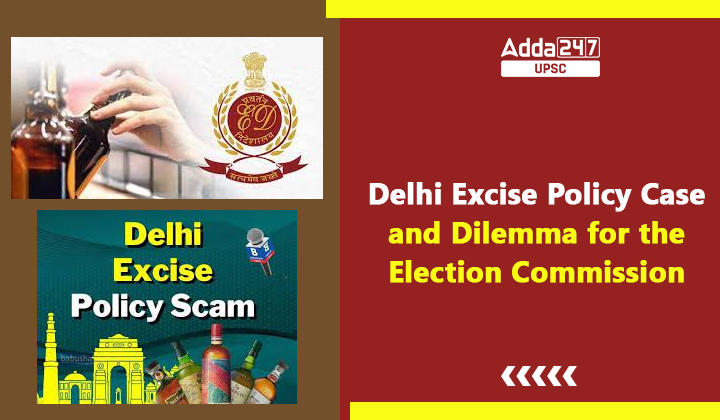Table of Contents
Delhi Excise Policy Case: A recent proposal by the Enforcement Directorate to name the Aam Aadmi Party (AAP) as an accused in the Delhi excise policy case has thrown the Election Commission (EC) into uncharted waters. This move brings to light a critical juncture where electoral rules and laws provide limited guidance on the actions to be taken when a political party is accused of illegality. This article explores the complexities surrounding the case and the challenges faced by the Election Commission in responding to such situations.
Enforcement Directorate’s Proposal
Delhi Excise Policy Case
The backdrop of the Delhi excise policy case sets the stage for the Enforcement Directorate’s proposal, presenting a scenario where a political party is implicated in alleged wrongdoing. The intricacies of this case, involving legal and electoral dimensions, highlight the need for a nuanced approach by the concerned authorities.
Electoral Rules and Punitive Actions
Limited Options for the Election Commission
Examining the arsenal available to the Election Commission in dealing with allegations against a political party reveals a challenging landscape. Former officers of the poll panel shed light on the constraints and limitations that the EC faces when contemplating punitive actions.
Suspension or withdrawal of Recognition
The Election Commission’s authority to suspend or withdraw a party’s recognition is being explored in the context of the Delhi excise policy case. However, the boundaries of this power, as outlined in the Election Symbols (Reservation and Allotment) Order, present a conundrum for the EC.
Challenges in Punitive Measures
Ambiguities in Paragraph 16A of the Symbols Order
The absence of clear directives regarding accusations of illegality poses challenges for the Election Commission. Ambiguities in Paragraph 16A of the Symbols Order are scrutinized to understand the extent of the EC’s jurisdiction in cases where a party is accused but not convicted.
Accusation vs. Conviction
Exploring the nuances between being accused and being convicted reveals a crucial distinction.
Former officers provide insights into the legal intricacies surrounding the treatment of political entities facing allegations and the precedent set by disqualification only upon conviction.
Dilemma of De-Registration
Section 29A of the Representation of the People Act, 1951
The option of de-registering a political party is considered, but Section 29A of the Representation of the People Act, 1951, outlines stringent criteria for such an action. The three exceptions under which the EC can review its decision are analyzed to determine the feasibility of de-registering the party.
Legal Complexities in Dealing with Political Parties
Legal experts weighed in on the complexities surrounding the potential de-registration of the party. The absence of provisions in existing laws to address scenarios where a party is accused under acts like the Prevention of Money Laundering Act (PMLA) raises questions about the legal framework’s adequacy.
Critique of Adding a Political Party Under PMLA
Section 70 of the PMLA: Company vs. Political Party
A critical examination of Section 70 of the Prevention of Money Laundering Act (PMLA) is undertaken to evaluate whether a political party can be added as an accused. Legal experts scrutinize the distinctions between companies and political entities, raising fundamental questions about the applicability of this provision.
Legal Experts’ Perspectives and Inclusions under PMLA
Prominent legal voices offer insights into the technicalities and challenges associated with adding a political party under Section 70 of the PMLA. The debate over the suitability of such a move and its potential implications for the broader legal landscape unfolds in this section.
Way Forward
Clarity in Electoral Laws
As the Election Commission grapples with the Delhi excise policy case, the need for clarity in electoral laws becomes evident. Recommendations and proposals for refining existing laws to encompass scenarios involving accusations against political parties are explored in this section.
Legal Accountability and Political Implications
Striking a delicate balance between legal accountability and political repercussions is a paramount consideration for the Election Commission. The challenges and responsibilities that come with handling cases of alleged wrongdoing by political entities shape the discussion on the way forward.
Conclusion
In conclusion, the Delhi excise policy case thrusts the Election Commission into a complex situation where legal intricacies intersect with electoral ambiguities. The lack of clear directives to deal with accusations against political parties underscores the evolving nature of India’s democratic landscape. As the case unfolds, the role of the Election Commission in shaping electoral norms and responding to unprecedented challenges remains a focal point of scrutiny and discussion.




 TSPSC Group 1 Question Paper 2024, Downl...
TSPSC Group 1 Question Paper 2024, Downl...
 TSPSC Group 1 Answer key 2024 Out, Downl...
TSPSC Group 1 Answer key 2024 Out, Downl...
 UPSC Prelims 2024 Question Paper, Downlo...
UPSC Prelims 2024 Question Paper, Downlo...




